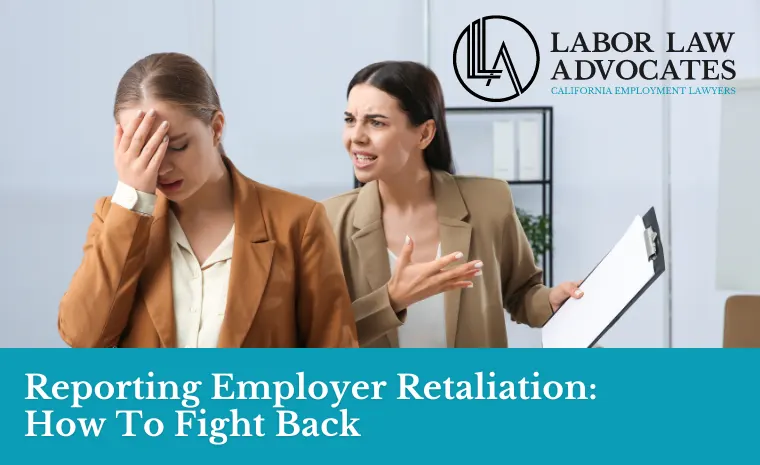Reporting Employer Retaliation: How To Fight Back
Reporting employer retaliation is a scary situation, but it is an important step to protect your rights as an employee. Retaliation can come in many forms, including demotion, harassment, or termination, and it is often in response to an employee’s protected activity, such as discrimination complaints or whistleblowing.
Fighting back against retaliation can seem overwhelming, but there are steps you can take to protect yourself. This may include gathering evidence, filing a complaint with the appropriate agency, or seeking legal representation. It is important to understand your rights and protections under the law and to have a plan in place to address any potential retaliation.
Experienced increased scrutiny or disciplinary actions without justification?
In this article, we will explore the steps you can take to report and fight back against employer retaliation, as well as provide resources to help you navigate this process.
Understanding Employer Retaliation
According to the U.S. Department of Labor, when an employer, either through a direct approach or via a manager, supervisor, or administrator, fires an employee or takes any other type of harmful action against them for participating in protected activity, it becomes employer retaliation.
Employer retaliation is any negative or adverse action that could discourage a reasonable employee from reporting a possible violation or engaging in similar protected activities, such as reporting harassment or discrimination, filing a complaint with the Equal Employment Opportunity Commission (EEOC), or participating in an investigation. Negative action can include firing, demotion, suspension, or other discriminatory behavior.
Recognizing Signs of Workplace Retaliation
Recognizing signs of workplace retaliation is essential because it can help employees protect their rights, safety, and well-being. Common signs of retaliation that you need to note include:
- Being excluded from work-related activities or meetings
- Receiving negative performance reviews without justification
- Being subjected to increased scrutiny or disciplinary actions
- Being given undesirable work assignments or shifts
- Suffering a decrease in pay or benefits
Why is there a need to recognize retaliation fast? Identifying signs of illegal retaliation is crucial for the following reasons:
- Protecting Employee Rights: According to OSHA Worker Rights and Protections, employees have the right to report workplace violations without fear of retaliation. Recognizing signs of retaliation can help employees protect their rights by taking appropriate action, such as filing a complaint with their employer or a government agency.
- Promoting a Safe and Healthy Workplace: Workplace retaliation can create a toxic work environment that negatively impacts employee morale and productivity. Recognizing signs of retaliation can help employers identify and address issues that may be affecting the workplace culture and create a safe and healthy work environment.
- Building Trust: Employees who feel their employer supports them and takes their concerns seriously are more likely to feel valued and engaged. Recognizing signs of retaliation and addressing them promptly can help build trust between employers and employees and foster a positive work environment.
Reporting Employer Retaliation

Experiencing employer retaliation can be a stressful and challenging experience for employees. However, it’s crucial to take action and report any incidents to protect your rights and prevent further retaliation. There are several steps you can take to report employer retaliation, including documenting the incidents, reporting to your supervisor or human resources (HR) department, and seeking legal advice from a workplace retaliation lawyer.
By taking these steps, you can protect yourself and hold your employer accountable for their actions.
Document the Retaliation
If you suspect that you have experienced retaliation in the workplace, documenting the incidents is a critical step to take. Proper documentation can help strengthen your case and support your claims. It is crucial to record all evidence of retaliation, including the date, time, location, and a detailed description of the negative employment actions you experienced.
Having a clear and concise record of the events can help you remember important details and explain what happened accurately. Additionally, it is advisable to include the names of any witnesses who can corroborate your account of what happened. This information can be vital in supporting your claims if you need to take legal action.
It is also essential to make copies of any relevant documents that support your case, such as emails, memos, performance reviews, and any other communication related to the retaliation. Keep these records in a safe place and make sure they are easily accessible.
Documentation is crucial because it can help demonstrate a pattern of behavior by the employer or supervisor. The more documentation you have, the stronger your case will be, and the easier it will be for you to prove the illegal conduct you experienced and show the unsafe working conditions you were in.
Report The Adverse Employment Action
The next step in fighting back is reporting employer retaliation. Start by speaking with your supervisor or human resources representative. If you do not feel comfortable speaking with them, you can file a retaliation complaint with the EEOC.
In California, you can file the complaint with the Labor Commissioner’s Office via:
- Online channel
- Directly through any Labor Commissioner’s Office
Cooperate With The Investigations
If an investigation is initiated, it is important to cooperate fully. Provide any documentation or information requested and attend all interviews. Keep in mind that an investigation can take time, so be patient and continue to document any further retaliation that occurs.
Seek Legal Advice
If you have suffered severe retaliation, such as termination or demotion, you may want to consider seeking legal assistance. A qualified employment attorney can help you navigate the legal system and determine your legal rights. They can also help you file a legal claim against your employer if necessary.
Protecting Yourself from Retaliation
As a worker or job applicant, you are legally entitled to file a complaint in court or with a federal agency, participate in employment discrimination investigations or lawsuits, and engage in any protected EEO (equal employment opportunity) activity without fear of retaliation from your employer. Retaliation in any form, such as punishment or adverse employment action, for asserting your rights to be free from discrimination or harassment, is unlawful and a violation of your worker rights.
As an employee, it’s important to know that your employer cannot retaliate against you for engaging in certain activities, such as:
- Filing a complaint or acting as a witness in a discrimination investigation or lawsuit.
- Discussing or reporting employment discrimination or harassment with a supervisor or HR representative, including issues on immigration status,
- Providing information during an investigation of discrimination or harassment.
- Refusing to comply with instructions would result in discrimination.
- Taking action to prevent or report sexual harassment or intervening to protect others from it.
- Requesting reasonable accommodations for a disability or religious practice.
- Inquiring about your wage information.
Retaliation by your employer for engaging in these activities is prohibited by law and can result in legal action. Knowing your rights can help you protect yourself from employer retaliation and promote a fair and inclusive workplace.
FAQs
What is considered retaliation in the workplace?
Retaliation occurs when an employer takes adverse action against an employee for engaging in a protected activity, such as reporting harassment or discrimination, filing a complaint with the EEOC, or participating in an investigation.
What are the signs of employer retaliation?
Signs of employer retaliation can include being excluded from work-related activities or meetings, receiving negative performance reviews without justification, being subjected to increased scrutiny or disciplinary actions, being given undesirable work assignments or shifts, and suffering a decrease in pay or benefits.
How can I protect myself from employer retaliation?
To protect yourself from employer retaliation, it is important to understand your rights as an employee and stay informed about company policies and procedures. Keep accurate records of your work, including any feedback or performance reviews, and document any incidents of potential retaliation. If you experience retaliation, report it immediately to your supervisor or HR representative.
Can I file a lawsuit against my employer for retaliation?
Yes, you may be able to file a lawsuit against your employer for retaliation. It is important to speak with a qualified workplace retaliation lawyer to determine your legal rights and options.
What should I do if I witness retaliation against a coworker?
If you witness retaliation against a coworker, it is important to document the incident and report it to your supervisor or HR representative. You may also encourage your coworker to report the retaliation themselves and offer support and assistance throughout the process.
Consult With An Experienced Attorney
If you have experienced employer retaliation, getting in touch with an experienced workplace retaliation attorney for advice can be beneficial in many ways. A skilled employment attorney can provide legal guidance and advice on your rights, help you document the retaliation, and assess the strength of your case.
Labor Law Advocates has award-winning labor law lawyers. We can help you negotiate with your employer and represent you in legal proceedings if necessary. Increase your chances of a successful outcome and obtain the compensation and justice you deserve.
Call us at (424) 688-3632 for a FREE CONSULTATION.




